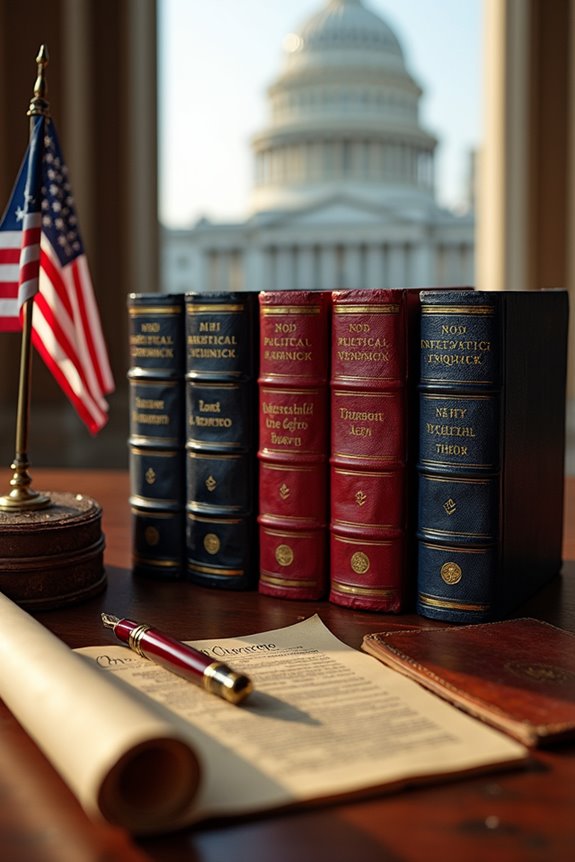To understand American government, we recommend exploring various political books that cover essential themes and historical context, including:
- Foundational works on American political thought, blending republicanism and liberalism.
- Influential biographies providing insights into presidential leadership and female political impact.
- Analyses of the U.S. Constitution, emphasizing the judiciary’s role and evolving interpretations.
- Examinations of Congress and its legislative processes.
- Varied perspectives on progressive, conservative, and libertarian thought in politics.
These topics will further enhance your comprehension of our democratic system.
Key Takeaways
- Explore foundational texts on American government, such as essays by Benjamin Franklin, to understand early political thought and governance principles.
- Key biographies like *Truman* and *American Lion* provide insights into presidential leadership and the evolution of American politics.
- Analyze the U.S. Constitution to grasp the structure of government, checks and balances, and the role of the judiciary in interpreting laws.
- Consider perspectives from progressive, conservative, and libertarian thought to appreciate the complexity of political identities and policies in America.
- Investigate Congress’s functions, including its legislative process and powers, to comprehend the development and impact of national policies.
Foundational Works on American Government and Political Thought
Understanding the foundational works on American government and political thought is essential for grasping the complexities of our political system.
- Republicanism influences emphasize a collective political body, shaping early American governance.
- Liberalism foundations stress individual rights and autonomy, forming a critical backbone of our democracy.
- Early political ideas emerged from diverse sources, including Puritan covenants and Native American speeches.
- Notable texts, like Benjamin Franklin’s essays, reflect pragmatic political thought essential to understanding our current system, while the emphasis on historical context enriches our comprehension of these ideas.
- The writings of John Adams and Puritan political works reveal important concepts such as the separation of church and state. Additionally, the book Foundations of American Political Thought provides a comprehensive examination of various political influences from the Puritans to the Civil War.
- These foundational texts provide context from colonial times through the Civil War, highlighting the evolution of American political identity and practices.
Key Political Biographies for Context on American Leadership

When we explore key political biographies, we gain invaluable insights into American leadership and its evolution. Notable works include:
- *Truman* by David McCullough, showcasing Harry S. Truman’s integrity and consensus-building during pivotal moments like WWII and the Cold War.
- *American Lion* by Jon Meacham, detailing Andrew Jackson’s role in shaping the modern presidency through his assertive use of veto power.
- *In Her Own Words: Ruth Bader Ginsburg*, highlighting her significant influence on civil rights as a Supreme Court justice.
- *In Her Own Words: Eleanor Roosevelt*, illustrating her humanitarian efforts and advocacy for equal rights.
These biographies not only reflect presidential leadership but also emphasize the crucial female influence that has shaped American governance and societal progress. Understanding the stories of U.S. leaders is essential for grasping the complexities of their roles and decisions, as these works often reveal themes of resilience that resonate with readers navigating their own challenges.
Insights Into the US Constitution and Judiciary

The U.S. Constitution serves as the foundation of our government, outlining its structure and operation. It consists of a Preamble and seven Articles, establishing the Legislative, Executive, and Judicial branches. This design fosters a system of checks and balances, preventing any branch from gaining too much power.
The Judicial Branch, primarily established under Article III, interprets laws and guarantees constitutional adherence. Key features include:
- Judges’ lifetime appointments promote judicial independence, insulating them from political influence.
- Constitutional interpretation varies, with debates between originalism and living Constitution theories shaping judicial decisions. Additionally, the historical context of landmark cases, like Marbury v. Madison, demonstrates the judiciary’s power to review and invalidate conflicting laws. Moreover, the Constitution has been amended 27 times since 1789, reflecting the evolving nature of American society.
Understanding these elements is vital for grasping the complexities of American governance and law.
Understanding American Political Institutions and Congress

American political institutions play an essential role in shaping governance and policy in our nation. Understanding Congress is vital, as it forms the legislative branch of the U.S. government.
- Congressional Structure:
- Bicameral, consisting of the Senate (100 members) and the House of Representatives (435 members).
- Senators serve six-year terms, while House members serve two-year terms.
- Legislative Process:
- Congress drafts, debates, and enacts laws that impact national policy. In addition, it faces ongoing challenges related to electoral integrity, as issues like gerrymandering can affect legislative representation.
- It controls federal spending and taxation, holding the power to impeach officials.
- Both chambers must cooperate, fostering deliberation and compromise to create effective legislation. The two-party system significantly influences the dynamics of legislative decision-making and the passage of laws.
Through its checks and balances, Congress maintains a balance of power within the federal government, ensuring accountability.
Perspectives on Progressive, Conservative, and Libertarian Thought in American Politics

In exploring the diverse landscape of political thought in the United States, we can see how progressive, conservative, and libertarian perspectives shape our governance and societal values.
- Progressive Values: Focus on personal freedoms, advocating for social justice, higher taxation on the wealthy, and skepticism toward capitalism. Progressives often argue that lower economic freedom leads to greater inequality and social unrest, which is emphasized in A Peoples History that critiques mainstream narratives.
- Conservative Principles: Emphasize economic freedom, law and order, and traditional moral frameworks, while grappling with mixed views on protectionism.
- Libertarian Autonomy: Prioritize both personal and economic freedoms, advocating for limited government intervention and civil liberties, opposing high taxation and extensive regulation.
These perspectives illustrate the ongoing debate over economic policies and the role of government, reflecting our nation’s complex political identity. Understanding these viewpoints is essential for grasping the nuances of American governance.
Frequently Asked Questions
How Do These Books Address Contemporary Political Issues?
We see these books deliver contemporary relevance through sharp political analysis, exposing ideological divides and social justice struggles. They encourage us to reflect on governance, urging bipartisan cooperation and understanding in today’s complex political landscape.
What Are the Qualifications of the Authors Listed?
We see that the authors’ backgrounds and academic credentials highlight their expertise. With university affiliations and advanced degrees, they effectively translate complex political concepts into accessible content, ensuring readers receive well-researched and relevant information.
Are These Books Suitable for Beginners in Political Studies?
Absolutely, we believe these books offer excellent beginner accessibility, ensuring foundational knowledge is established. They break down complex political ideas into understandable concepts, making it easier for us to engage with and grasp essential topics.
How Can I Access These Books or Where Can I Purchase Them?
We can access these books through online bookstores like Amazon and Penguin Random House, or find great selections at local libraries. Both options offer fantastic avenues to explore and purchase political literature conveniently.
Do These Books Include References to International Political Contexts?
When it comes to these books, we’ve found they often touch on global influences through comparative analysis, linking U.S. policies with international contexts, though such references are usually supplementary rather than central to the core content.






